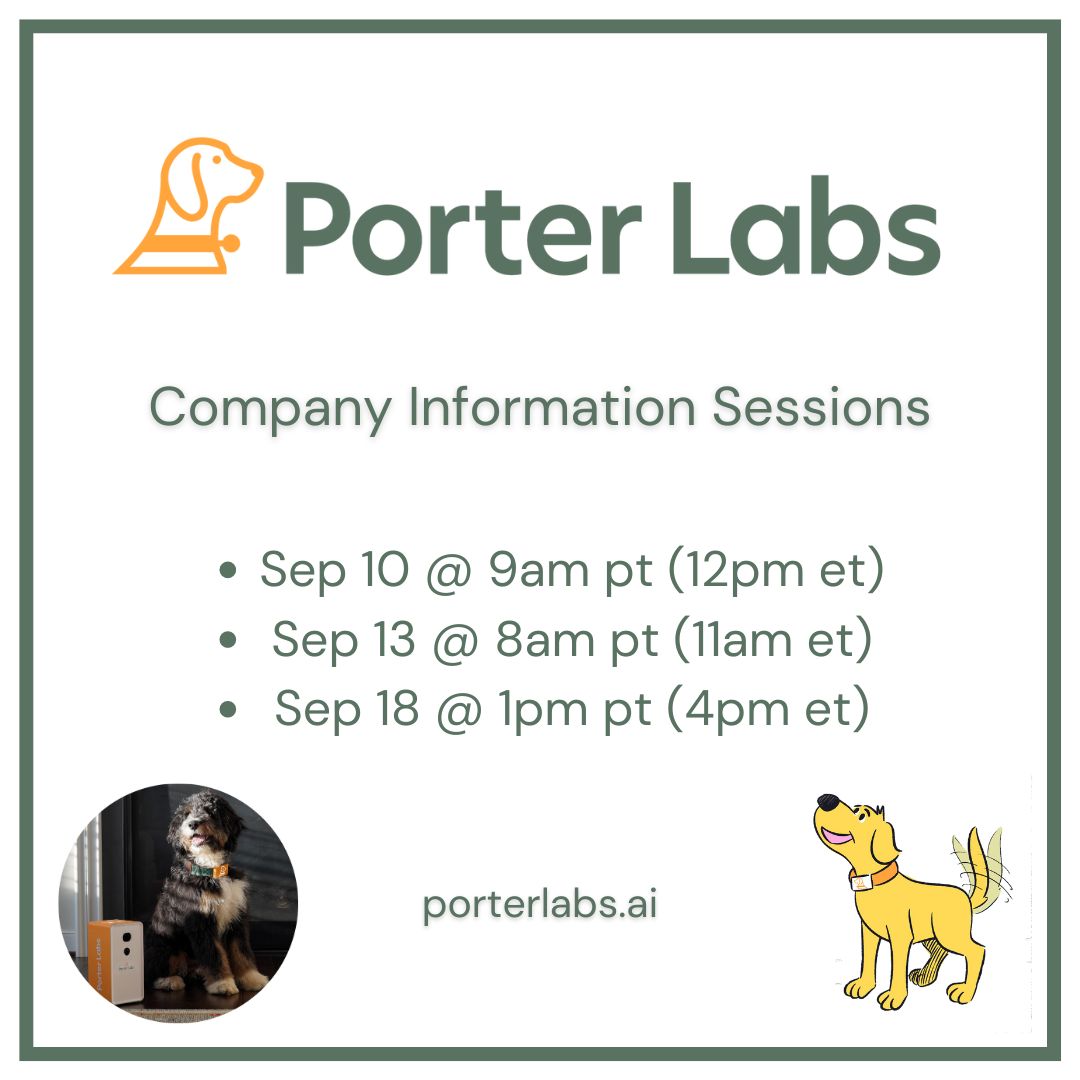Perhaps you’ve come home to find your favorite pair of shoes reduced to canine-caused confetti. Or maybe leash walks with your dog are a constant tug-of-war. While training your dog is a rewarding experience, and is great – and vital! – for bonding, the necessary commitment to consistency can conflict with a busy lifestyle that’s full of other urgent responsibilities, too.
Here at Porter Labs , we’re looking at ways to make training more consistent, engaging, and effective for both you and your dog, plus millions of unplaced shelter dogs. Enter Artificial Intelligence (AI), a powerful technology with the potential to revolutionize the world of dog training in the home, and inside the kennels or play rooms of professional training and boarding facilities, as well as shelters, which are full of dogs in need!
AI 101 for Dog Lovers
Imagine a world where your dog can learn at their own pace, receive consistent training cues, and even play games designed to reinforce good behavior. This is the growing reality of AI in dog training. Simply put, AI refers to the development of intelligent machines that can mimic human cognitive functions like learning and problem-solving.
Now, AI for dog training doesn’t involve robots holding leashes or dispensing philosophical advice. Instead, it involves easy-to-use tools and applications that leverage AI to create a more personalized and efficient training experience.
Enhancing Treats and Clickers
Dog training has come a long way. We’ve moved on from harsh dominance-based methods to more positive reinforcement techniques that reward good behavior. Clicker training, for example, uses a clicking sound to mark desired behaviors, followed by a treat or praise.
However, all training methods have some limitations — most of them human. Our busy schedules can make it difficult to maintain consistent training sessions, and finding a qualified trainer isn’t always easy. When you do find that great dog trainer locally or online, there’s your own schedule to manage. Additionally, each dog learns at their own pace and may respond differently to traditional methods.
Enter AI: A New Era of Dog Training
This is where Porter Labs steps in with AI-enhanced dog training, offering new and exciting possibilities. Imagine a smart collar that tracks your dog’s activity and rewards them with a treat for completing a training exercise! Or a program that uses AI to adapt to your dog’s learning style and keeps them engaged with increasingly challenging tasks. Imagine further that you — or your staff, if you are the manager of an animal shelter — don’t have to be standing by to guide these lessons. You can be at work, running errands, or on a Zoom call in the other room. Your dog doesn’t have to feel bored and alone with an AI guide to fill their active hours with learning and fun.
The benefits of AI training are numerous:
- Increased consistency: AI tools can provide consistent cues and rewards, something even the most dedicated owner might struggle with at times.
- Personalized learning: Gone are the days of “one size fits all” training. AI can analyze a dog’s behavior and tailor a training plan to their specific needs and learning style.
- Convenience and accessibility: AI tools will keep your dog engaged while you are at home or when you are on the go at work, on errands, or off having dog-free fun (although dog lovers may argue there is no such thing). You will one day even take AI tools with you on vacation, making your dog’s stay in a hotel room or at a friend’s home more interesting when they can’t join you. All of this makes training and structured engagement more accessible for busy dog owners.
An AI Future for Service Dog Training
While AI offers exciting possibilities for companion dog training, its application can be particularly valuable in the training of puppies and dogs as service companions. In consultation with professional service dog trainers, AI algorithms could be tailored to their needs, and the specific skills in which service dogs are trained. Here’s how:
- Support for volunteer puppy-raisers: Some service dog programs place young puppies in the homes of volunteer puppy-raisers. While these volunteers try to keep their pups with them as much as possible, an in-home AI training module would help maintain training consistency and prevent boredom in these specially-chosen pups, improving success.
- Screening and matching: AI algorithms can analyze a puppy or dog’s activity level and speed in learning to identify service dog candidates. It could help determine if the dog exhibits desired qualities for a specific service, such as calmness for an in-home service dog or therapy dog, or high energy for a search and rescue dog.
- Specialized training: AI could be used to tailor training programs to the specific service the dog will provide, with tasks like object retrieval and medical alert detection. Imagine AI-enhanced customized training modules that incorporate voice and physical cues relevant to the service dog’s future role.
- Ongoing support for the new owner and handler: The new owner could be provided with an AI training suite that continues to provide fun engagement and training support for the service dog in their new home.
- Help to train companion dogs in rescue or therapy animals: Individual dog owners sometimes see special potential in their own pet dog, and seek out training and certification on their own in search-and-rescue, or as a therapy animal in schools, hospitals, and nursing homes. A home AI training suite will help keep the bright minds of these dogs engaged when their owner can’t be with them.
An Extra Chance: AI for Shelter Dogs Today and Tomorrow
Shelter dogs, and the people who care for them, face unique challenges. With limited time and resources, it can be difficult for staff and volunteers to find time to assess individual canine personalities and train every dog effectively and consistently. Each dog may get only a few minutes a day, if that, for a training walk or time in a play yard. This isn’t the fault of the animal sheltering system; it’s just a matter of math. Dollars and hours need to be split up between all the many responsibilities required to feed, shelter, and provide a dynamic adoption program for dogs in need.
AI can be a game-changer for shelters by significantly increasing capabilities in:
- Behavioral assessment: AI has the ability to analyze a dog’s behavior patterns to identify potential issues like anxiety or fear, allowing for better matching with suitable adopters.
- Training efficiency: AI can optimize training time for shelter staff, allowing them to focus on more complex cases and spending more time with individual dogs who need more 1:1 training and support.
- Pre-adoption bonding: Depending on shelter policies, AI tools can potentially permit adopters to begin basic training remotely through interactive games while their dog is still at the shelter or in a foster home – even before they bring their dog home – fostering a bond before adoption.
- Follows the dog home: Adopters will also one day be able to purchase the same AI tools to use at home, to continue the training their new pet is familiar with
Ethical Challenges and Considerations of AI in Dog Training
Of course, with any new technology involving animals, and their relationship with people who cherish and depend on them, there are significant ethical considerations.
- Ethical and accurate data collection: Data used to train AI algorithms for companion, service, and shelter dog training needs to be collected responsibly, ensuring privacy and addressing potential biases. What we learn from AI behavior data-collection will have long-term impact on how animal shelters and service organizations make decisions about the fate and future placement of the animals in their care.
- Dogs need time off from lessons to relax and play: AI tools in the home, kennel, training room, or play yard can be programmed to determine when a dog is restless and seeking engagement. It should not be relentlessly used to ‘speed up’ training. Dogs should not be barraged with lesson cues when they want to rest or enjoy unstructured play with a human or animal companion.
- Human love and expertise remains crucial: The human-dog bond remains irreplaceable. AI tools can be a huge enhancement for dog training and communication, but they aren’t meant to replicate the love and affection a human provides. Daily hands-on training with their caring owner and time off for simply fun and play is needed to provide emotional support, build trust with the dog, and to be alert to unforeseen circumstances. And while an AI training suite might help keep an anxious dog engaged when left alone, veterinary and behavior specialists should always still be consulted as part of a holistic health care plan.
- Accessibility and Cost: As with any new technology, making AI-powered service dog training solutions accessible and affordable for those in need will be crucial for widespread adoption.
Where AI, Porter Labs, and PupStation are Headed Together
The future of AI in dog training is brimming with exciting possibilities and at Porter Labs, we’re excited about being part of it. Our work at this time is to engage deeply with trainers and other canine professionals who have access to larger populations of dogs. This will help us gather information and test and refine our technology before it is made available to the consumer market.
We call our flagship system PupStation which is an AI-enhanced suite of dog training tools. The PupStation app allows humans to customize each dog’s experience and view training, activity, and sleep statistics. This is how it works:
- The PupStation Collar uses advanced sensors to track a dog’s movement
- Machine-learning algorithms determine what the dog is doing
- The PupStation Feeder dispenses food when the dog makes the right choices
- PupStation Satellites make an entire home and play yard an interactive play and learning zone
PupStation is being continually developed by real dog parents who understand the loving and challenging partnership we have with the bright and active canine companions who share our lives.
Let’s Unlock AI Dog Training Potential Together
Here at Porter Labs, we know that AI holds immense potential to revolutionize dog training, making it more effective, accessible, and personalized. For shelter dogs, PupStation’s AI-enhanced monitoring and training can provide vital insight into the needs and behavior of each individual dog – a key to finding their forever homes. As AI technology continues to develop, the future of dog training looks brighter and brighter, foreshadowing a world where every dog, regardless of background, can unlock their full potential and thrive with their human companions.
So, the next time you’re contemplating your own dog’s training, or working with dogs in a professional capacity, think about the possibilities of AI-powered tools as well. If you’re the manager of an animal shelter or service dog organization, consider how AI could make training easier for your staff, volunteers, adopters, clients, and the dogs you have dedicated your life and work to.
Learn more about how to participate with us, or subscribe to stay updated on the latest in AI and dog training.
If you have questions, we’re here to answer them! You can always send us a message.
We love to hear from you!




